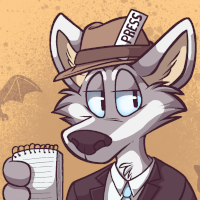CNN’s This Is Life is amazing TV – relations with the media – and more positive furry stories.
by Pup Matthias
CNN’s This is Life with Lisa Ling: Furry Nation aired last Sunday. As Furries do, some loved it and some hated it. That’s not surprising. When the critically acclaimed show (built around exploring the different corners of people’s lives) tweeted their season five episodes, fandom freaked out. Furries were tweeting about how CNN would cover them in the same season with MS-13, meth, screen addiction, and gender fluidity. Or how Furries complained that Anthro Northwest was letting TV do recording at their convention. Or how this episode was either the second coming, or the dawn of the apocalypse.
Boy, that changed overnight. If it sounds like I’m salty, I am to a degree. The reactions leading up to the premiere were just tiring. Many furries painted all journalists as TMZ tabloids looking for the next juicy clickbait headline, but looking at an episode shows Lisa Ling being a thoughtful reporter who wants to show the human stories behind the topics she covers. (You can see all episodes legally with a TV subscription here.)
It’s funny to see Furries wanting to share their stories and promote the good this community can do; yet push away anyone wanting to report on it. It lets rumors continue to define us. Of course, as I’m writing this, the BBC has done a piece about the hacking of an adult furry site many haven’t heard of. It’s actually a relatively neutral story in comparison to what happened to Ashley Madison (the website devoted to helping people cheat in their relationships), but with buxom zebras and scantily clad lionesses instead of mistresses/guys on the side (or whatever). Beyond the furry aspect, it’s neither positive nor negative, it’s just there. Perhaps those rumors are losing power just from becoming old and familiar.
It’s not without merit to be skeptical about the media covering this fandom. YouTuber Quartz Husky did a video about cable news coverage:
The issue as I see it, isn’t pointing out that there are people who will use us for sensational clicks. The issue is then finding positive examples to compare and contrast for what we, as a community want. The dialogue about the media vs. the fandom is so black-and-white, that any form of coverage is seen as bad. It leaves very little room for us to showcase who we are because there are no “good” reporters.

